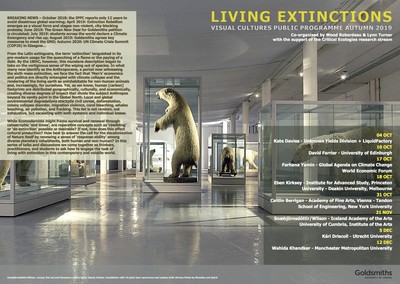Living Extinctions: Visual Cultures Public Programme Autumn Term 2019
Roberdeau, Wood and Turner, Lynn. 2019. 'Living Extinctions: Visual Cultures Public Programme Autumn Term 2019'. In: Living Extinctions: Visual Cultures Public Programme Autumn Term 2019. Goldsmiths, University of London, United Kingdom 4 October - 12 December 2019. [Conference or Workshop Item]
![[img]](https://research.gold.ac.uk/27001/1.hassmallThumbnailVersion/thumbnail_LIVING%20EXTINCTIONS%20SERIES%20final.jpg)
|
Image
thumbnail_LIVING EXTINCTIONS SERIES final.jpg - Supplemental Material Download (370kB) | Preview |
Abstract or Description
BREAKING NEWS – October 2018: the IPPC reports only 12 years to avoid disastrous global warming; April 2019: Extinction Rebellion emerges as a visual force and stages non-violent, city-blocking protests; June 2019: The Green New Deal for Goldsmiths petition is circulated; July 2019: students across the world declare a Climate Emergency and rise up; August 2019: Goldsmiths agrees key measures to meet the GND; Autumn 2020: UN Climate Crisis Summit (COP26) in Glasgow…
From the Latin extinguere, the term ‘extinction’ languished in its pre-modern usage for the quenching of a flame or the paying of a debt. By the 18thC, however, this mundane description began to take on the vertiginous sense of the wiping out of species. In what many now identify as the Anthropocene, a period now witnessing the sixth mass extinction, we are faced with the fact that ‘Man’s’ economics and politics are directly entangled with climate collapse and the rendering of the living earth as uninhabitable for non-human animals and, increasingly, for ourselves. Yet, as we know, human [carbon] footprints are distributed geographically, culturally, and economically, creating diverse degrees of impact that divide the subject Anthropos beyond its vanity point in the Global North. Local and global environmental degradations stockpile civil unrest, deforestation, colony collapse disorder, migration violence, coral bleaching, whales beaching, air pollution, and fracking. This list is not random, not exhaustive, but escalating with both systemic and individual losses.
While Ecomodernists might frame survival and renewal through catastrophic ‘end times’, are reparative concepts such as ‘rewilding’ or ‘de-extinction’ possible or desirable? If not, how does this affect cultural production? How best to answer the call for the decolonization of Nature itself by renewing a sense of ‘response-ability’ among diverse planetary cohabitants, both human and non-human? In this series of talks and discussions we come together as thinkers, practitioners, and students to ask how to engage the task of living with extinction in this contemporary and volatile world.
|
Item Type: |
Conference or Workshop Item (Other) |
||||||
| Departments, Centres and Research Units: |
|||||||
| Dates: |
|
||||||
| Event Location: |
Goldsmiths, University of London, United Kingdom |
||||||
| Date range: |
4 October - 12 December 2019 |
||||||
| Item ID: |
27001 |
||||||
| Date Deposited: |
24 Sep 2019 09:49 |
||||||
| Last Modified: |
29 Apr 2020 17:18 |
||||||
|
URI: |
View statistics for this item...
 |
Edit Record (login required) |

 Tools
Tools Tools
Tools
